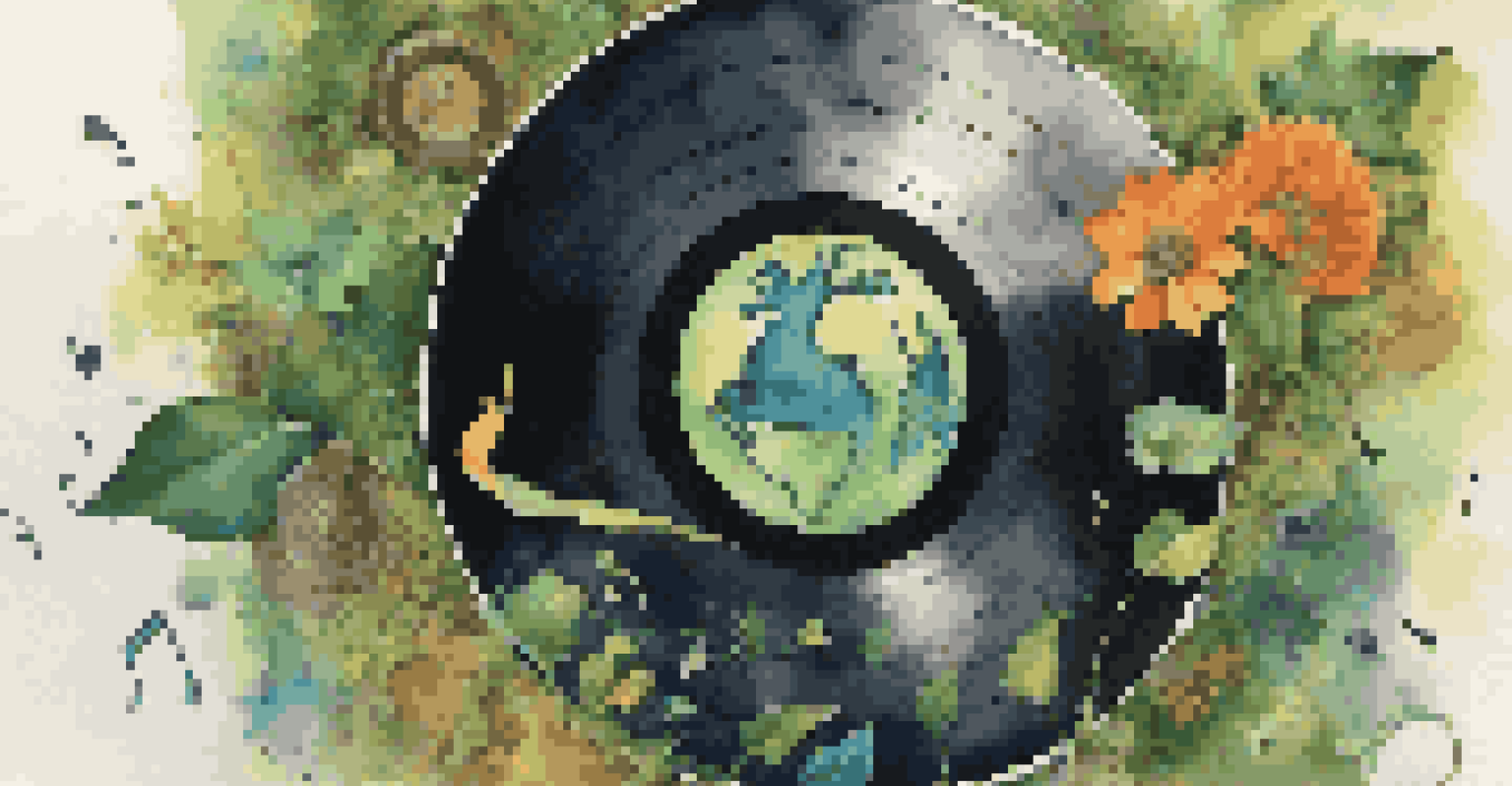Music as a Form of Protest Against Environmental Degradation

The Historical Roots of Protest Music
Throughout history, music has been a powerful vehicle for social change. From the civil rights movement to anti-war protests, artists have used their voices to resonate with the struggles of their times. Environmental issues have also found their place in this rich tapestry of protest music, with songs addressing pollution, climate change, and habitat destruction.
Music can change the world because it can change people.
Musicians like Bob Dylan and Joan Baez paved the way, using folk music to highlight societal injustices. Today, this tradition continues with contemporary artists who draw attention to environmental crises through their lyrics and performances. For instance, songs like "Big Yellow Taxi" by Joni Mitchell remind us of the beauty of nature and the urgent need to protect it.
As the stakes grow higher with the ongoing climate crisis, music remains a timeless form of protest, rallying communities and igniting passion for environmental issues. It serves not only to entertain but to educate and inspire action, proving that melodies can be just as impactful as marches.
Modern Artists Leading the Charge
In today's music scene, several artists have emerged as vocal advocates for the environment. Bands like Coldplay and artists such as Billie Eilish use their platforms to raise awareness about ecological issues through their music and public statements. Their influence reaches millions, making them powerful allies in the fight against environmental degradation.

Take Billie Eilish’s song "All the Good Girls Go to Hell," which vividly depicts the consequences of climate change and the urgency of taking action. Such tracks resonate with younger audiences, driving home the message that they have a role in protecting the planet. By infusing their music with messages of activism, these artists inspire their fans to think critically about the world around them.
Music as a Catalyst for Change
Throughout history, music has served as a powerful medium for social and environmental activism, inspiring action and raising awareness on critical issues.
Moreover, festivals like Glastonbury have adopted eco-friendly practices, showcasing how music events can also be platforms for environmental advocacy. This blend of entertainment and activism highlights a growing recognition within the music industry of its potential to influence societal change.
Lyrics that Spark Change
Lyrics often serve as the heart and soul of protest music, articulating the frustrations and hopes of the community. For instance, songs like "Earth Song" by Michael Jackson and "Mercy Mercy Me (The Ecology)" by Marvin Gaye poignantly express sorrow for the planet's suffering. These powerful words not only evoke emotions but also challenge listeners to reflect on their impact on the environment.
The future of our planet is in our hands, and music can inspire us to take action.
Incorporating vivid imagery and storytelling, these songs create a connection between the listener and the issues at hand. They transform abstract concepts like climate change into relatable experiences, making it easier for people to engage. This connection is crucial, as it fosters a sense of responsibility and urgency to take action.
As more artists focus on environmental themes, the lyrical landscape of protest music continues to evolve. This evolution not only amplifies the message of environmentalism but also encourages a broader audience to join the cause, proving that music is a universal language of protest.
Music Festivals as Platforms for Activism
Music festivals have long been a gathering place for fans, but they are also becoming crucial platforms for environmental activism. Events like Coachella and Lollapalooza have started to incorporate sustainability initiatives, showcasing how music can drive change on a larger scale. These festivals often feature panels and workshops that educate attendees on environmental issues, creating a community around activism.
Moreover, artists often use their performances to address climate change directly from the stage. By speaking about their commitment to the environment, they encourage fans to reflect on their own actions. This blend of entertainment and education fosters a deeper understanding of the environmental crisis among concert-goers.
Modern Artists Championing Ecology
Contemporary musicians like Billie Eilish and Coldplay leverage their platforms to advocate for environmental issues, engaging millions in the fight against climate change.
As the festival landscape evolves, the partnership between music and environmental advocacy becomes increasingly vital. By transforming these cultural events into hubs of activism, the music industry plays a crucial role in shaping public discourse around environmental issues.
The Role of Social Media in Amplifying Messages
In the digital age, social media has become a powerful tool for artists to amplify their messages about environmental issues. Platforms like Instagram, Twitter, and TikTok allow musicians to reach a vast audience, sharing their thoughts and urging action in real-time. This immediacy has transformed how protest music is consumed and understood, making it more accessible than ever.
For instance, many artists use hashtags like #ClimateAction or #SaveThePlanet to mobilize their followers and spread awareness. This online engagement can lead to significant real-world impacts, as fans unite to support environmental causes. By leveraging their platforms, musicians can inspire collective action and foster a sense of community among their listeners.
Furthermore, social media enables grassroots movements to gain momentum, often driven by the very songs that inspire them. This interconnectedness between music and activism illustrates the profound influence artists can wield in addressing environmental degradation.
Collaborations for a Greener Future
Collaborations between musicians and environmental organizations are becoming increasingly common, creating powerful synergies in the fight against degradation. Initiatives like Global Citizen and the Earth Day Network harness the influence of artists to spread awareness and promote environmental action. These partnerships amplify the message, reaching diverse audiences and driving engagement.
For example, the collaboration between artists for the song "Earth" by Lil Dicky brought together a star-studded cast to raise awareness about climate change. The catchy tune not only entertains but also educates listeners on the importance of protecting our planet. Such collaborations showcase the potential for music to serve as a unifying force in activism.
Festivals Promote Environmental Action
Music festivals are evolving into hubs for activism, incorporating sustainability initiatives and educating attendees on ecological challenges.
As artists continue to join forces with environmental organizations, the impact of their efforts can be magnified. By working together, they can inspire more significant change and foster a culture of sustainability within the music community.
The Future of Music and Environmental Activism
Looking ahead, the relationship between music and environmental activism is likely to deepen as awareness of climate issues grows. With more artists willing to speak out and address these topics, the potential for music to drive change remains robust. As new generations of musicians emerge, they carry with them a sense of responsibility to advocate for the planet.
Moreover, as technology continues to evolve, musicians will find innovative ways to engage with their audiences about environmental issues. Virtual concerts and streaming platforms can facilitate greater discussions around sustainability, reaching wider audiences than traditional methods. This adaptability ensures that the message remains relevant and impactful.

Ultimately, music will continue to serve as a vital tool for protest against environmental degradation. By harnessing the power of melody and lyrics, artists can inspire action, foster awareness, and unite communities in the fight for a healthier planet.